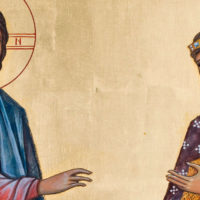Sylvia and Andrew just sang and played the beautiful Bach Aria from a larger cantata, ‘Ich habe genug’, which sometimes is translated with ‘I ask for no more’, but quite literally means, ‘I’ve had enough.’
We don’t find these words, ‘I’ve had enough’, in today’s gospel lesson; but Bach puts them into the mouth of Simeon, the pious old man who comes to the temple in Jerusalem because God told him that he would see the messiah there.
Now we tend to use this phrase, ‘I’ve had enough’, when we’re fed up with something or someone. We can’t take no more, we’re done, we are ready to let it go and be rid of it. Or we might say ‘I’ve had enough’ when we are invited to a dinner somewhere, and the gracious host or hostess offers us some more food after we’ve already eaten our fill.
We live in a society where you hardly ever hear, ‘I’ve had enough’ in the sense of: I’m satisfied. I have all that I need. My life has been rich beyond measure. We life in a time of ‘more’. We want more money, more comfort, more exciting experiences – even more life. People today get older than ever before, because diseases that in the past would have led to a certain death can be treated or at least be managed today. Life can be prolonged. And, for the most part, that’s amazing and wonderful. Many of us, myself included, probably wouldn’t be here today if it hadn’t been for great medical diagnostics and treatment.
But prolonging life also has its shadow side. I always have mixed feelings when I see one of those purple posters by the Alzheimer’s Association that usually hangs in BART stations or on BART trains, and it proclaims: The first survivor of Alzheimer’s is out there.
Don’t get me wrong, Alzheimer’s is a horrible disease, and I wished it didn’t exist. And I applaud the optimism and the hope of the people behind this slogan. But if someone survives Alzheimer’s, they still have to die of something else. Will we try to beat this other thing as well? Are we striving for immortality instead of death and resurrection? What has become of the beautiful expression from the Bible, that Abraham, Isaak, David and Job died ‘alt und lebenssatt’, as it says in German – literally ‘old and filled with life, satisfied with life’? Full of days?
In all my years as a pastor, I’ve met only a few people who had had enough of life, in a positive, peaceful sense, and were ready to let go and die. Most of the people I accompanied as they were dying tried to eke out more time at any cost, some were too concerned about the ones they’d leave behind to let go. However, there was a woman in my former congregation, J, who, overall, had such a wonderfully cheerful disposition that infected everyone around her. She had Parkinson’s and spent the last two years of her life in a nursing home – and the staff there just adored her.
After a few months in the nursing home, she was put on hospice care. When she told me about it, she just smiled, looked at me and said, ‘I am ready to go and see the Lord. In fact, I can’t wait!’ And we prayed, and we sang, and she was at peace with her life and with her maker. She had had enough. She was ‘old and filled with life’.
The irony was that, apparently, God wasn’t ready to call her yet. She was on hospice care for about 18 months, which is unusual. Whenever I entered her room, she would greet me with a cheerful, ‘Still here, pastor!’ And in the end she had the audacity to die while I was on vacation.
J was special. She had had anything but an easy life. She was born during the depression into a poor family, survived the huge explosion in Port Chicago during WW II, survived not one, but two abusive husbands, and raised 4 daughters almost single-handedly, all of whom turned out to be caring women steeped in faith. And in the end, there was the Parkinson’s. It just amazes me that she somehow was able to see the Lord, to see Christ, at work in her life. It was enough for her. No need for ‘more’. In the end, she was able to let go.
Ich habe genug – I’ve had enough. No, according to today’s gospel, old Simeon did not utter these words, but he could have. All his long life, Simeon had experienced dark times under the oppressive rule of the Romans. And all his long life, he had been longing and waiting for the Savior of Israel to come. In fact, God promised him that he wouldn’t die before he had seen the Messiah. So Simeon waited patiently. However, it wasn’t an idle waiting – he wasn’t twiddling his thumbs all those years – but an active kind of waiting. We hear that he was righteous and devout, that he was living according to his faith and to his hope. And it seems he had a special talent as well: the talent to listen to God, and to be receptive to God’s Holy Spirit. Coincidently, the name ‘Simeon’ means ‘he who listens’.
Now listening is more than hearing: listening implies to respond to what one hears. So Simeon seems to be a good listener, someone who listens to God’s voice and who pays attention to God’s signs. He listens when God tells him to go to the temple in Jerusalem on the day Mary and Joseph present their newborn infant there as they are required to do according to the Mosaic Law. Simeon doesn’t know what to expect. An eloquent teacher? A charismatic leader? A strong warrior? But he is open to the surprise God has in store for him, and he recognizes in the unremarkable infant Jesus the long awaited Savior.
Which leads to a scene that I imagine to be one of the most moving and one of the most tender moments in the gospel, where we have the old and wise man, who’s waited so long and never given up, overjoyed, smiling, laughing, crying for joy, taking the baby boy into his arms, and praising God. “Master, now you are dismissing your servant in peace, according to your word; for my eyes have seen your salvation.” In other words: God, I can die now, for what I’ve been waiting for has come to pass. And Bach so beautifully summarizes all that in his aria, ‘Ich habe genug’: I’ve had enough. I’ve taken the savior, the hope of all the faithful, into my longing arms.’
And since Simeon has had enough, since he knows that his hopes have been fulfilled in this infant, out of the richness of his life he gives the young family a gift beyond measure: a blessing. The old welcomes the young. The old embraces the new. The old can let go in peace and can confidently let this new thing unfold.
And let me say a word about the second old person filled with life whom we find in today’s gospel: Anna, a woman who, for most of her long life, has lived in the temple, close to God, serving God. Another devout person hoping and longing for the redemption of God’s people. And, since I talked about the meaning of Simeon’s name, let me just throw out that the name ‘Anna’ comes from the Hebrew ‘Hannah’ and means ‘merciful’. So here we have Simeon, the one who listens, and Anna, the one who is merciful, and they rejoice and praise God and send mother, father, and child on their way with a blessing. The old welcome the young. The old embrace the new. And a new day, a new era is dawning. There is a new chapter. The story continues. The light shines on.
The story of Simeon and Anna and also J and others who have died with the sense that they’ve had enough is a lesson in hope. A hope that lasts a lifelong – and beyond. A hope that acknowledges that we all are but a part of God’s infinite story. We do our part and then pass on the torch. We live our lives as faithfully and righteously as we can and then put this life back into God’s gracious, merciful and loving hands. And we can trust that God will do something new, for God is a God of life.
We can trust that, in every ending, there is the spark for a new beginning. And this is enough – in fact, more than enough.
This post is also available in: German





